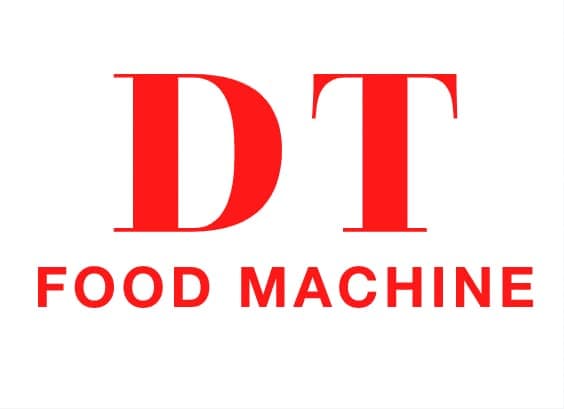Untul de arahide este unul dintre cele mai consumate distribuții din lume, Popular pentru textura sa cremoasă, aromă bogată, și valoare nutritivă. De la fabrici de produse alimentare la scară largă la mici întreprinderi de procesare a arahidei, Cererea de echipamente eficiente și fiabile este în continuă creștere. În centrul acestei industrii se află industrial Mașină de fabricare a untului de arahide, Un echipament specializat conceput pentru a transforma alunele prăjite în neted, cremos, sau unt de arahide crocante la scară.
În acest ghid cuprinzător, Vom explora totul despre mașina de fabricare a untului de arahide industriale: Cum funcționează, caracteristicile sale, Parametri tehnici, aplicatii, și cum să solicitați o ofertă (RFQ). Indiferent dacă sunteți un investitor de procesare a alimentelor, un manager de fabrică, sau pur și simplu cercetarea pentru afacerea dvs., Acest articol vă va ajuta să înțelegeți de ce această mașină este esențială și cum să o alegeți pe cea potrivită.
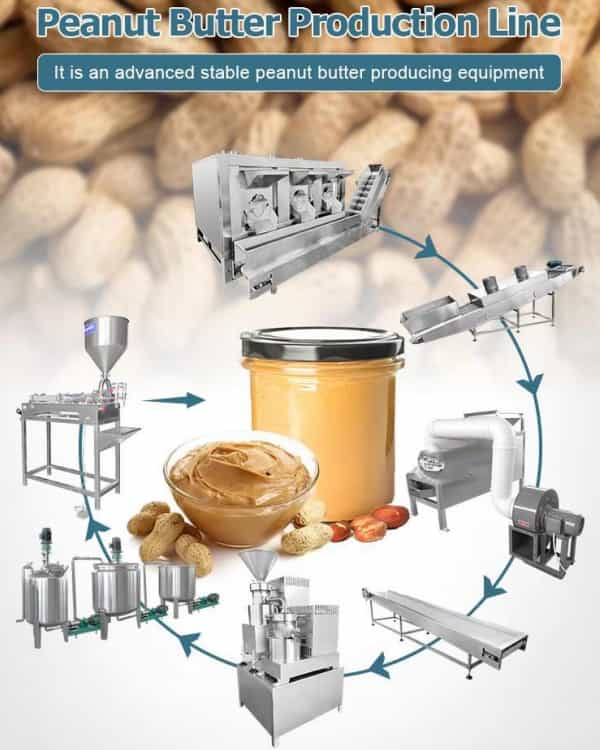
1. Ce este o mașină industrială de fabricare a untului de arahide?
O mașină industrială de fabricare a untului de arahide este o mașină de prelucrare a alimentelor de înaltă performanță, concepută pentru a măcina alunele prăjite în pastă. Folosește tehnologie avansată de măcinare - adesea sisteme de moară coloid sau moară de piatră - pentru a descompune alunele în particule foarte fine. Rezultatul este neted, consecvent, și unt igienic de arahide gata pentru ambalare sau procesare ulterioară.
Spre deosebire de amestecurile de uz casnic sau de mici tovarăși, Mașinile industriale sunt construite pentru funcționare continuă, producție mare, și respectarea standardelor internaționale de siguranță alimentară. Sunt utilizate frecvent în:
- Fabrici de unt de arahide
- Plante de procesare a nucilor
- Producători de produse alimentare
- Catering și bucătării mari
- Export-oriented food companies
2. Why Choose an Industrial Peanut Butter Making Machine?
✅ High Capacity
Industrial machines are designed to produce hundreds of kilograms per hour, making them suitable for commercial production.
✅ Consistency and Quality
The advanced grinding systems guarantee a smooth texture and stable product quality, reducing variations between batches.
✅ Durability
Made from food-grade stainless steel, these machines are resistant to corrosion and built to last in heavy-duty environments.
✅ Versatility
Many models can process other nuts such as almonds, caju, seminte de susan, or even chickpeas to make tahini or hummus.
✅ Hygiene and Safety
Machines meet international food safety standards (ISO, CE, or FDA-approved designs), ensuring safe production.
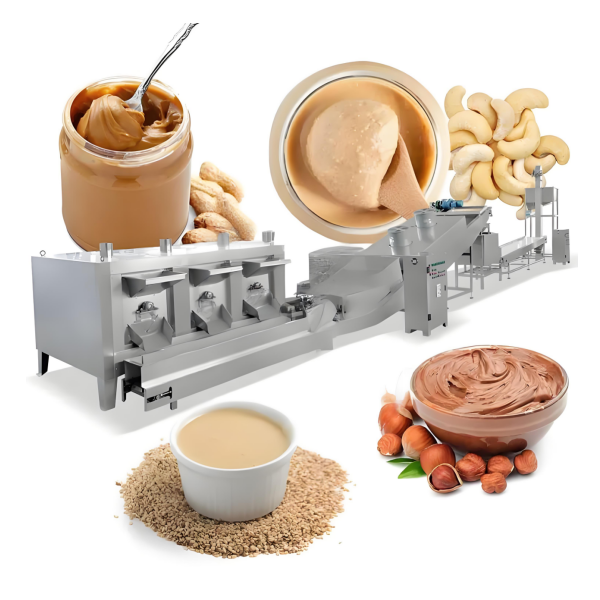
3. Working Principle of a Peanut Butter Machine
Majoritatea mașinilor de unt de arahide industriale folosesc Tehnologia morii coloid. Principiul este simplu, dar eficient:
- Hrănire - Alunele prăjite sunt introduse în buncăr.
- Măcinare -Mașina folosește un stator și un rotor rotativ de mare viteză pentru a aplica forfecare puternică, măcinare, și vibrații de înaltă frecvență.
- Omogenizare - Particulele sunt reduse la 2-50 microni, creând o pastă netedă.
- Răcire -Unele mașini folosesc sisteme de răcire a apei pentru a preveni supraîncălzirea și păstrarea aromei.
- Descărcare - Untul de arahide finisat este colectat și gata pentru ambalare sau amestecare cu aditivi (zahăr, sare, Stabilizatori).
4. Parametri tehnici ai mașinii de fabricare a untului de arahide industriale
Mai jos este un general Tabelul de specificații tehnice. Acești parametri pot varia în funcție de model și producător.
| Parametru | Interval de specificații | Note |
|---|---|---|
| Capacitate | 100 kg/h - 2000 kg/h | În funcție de dimensiunea modelului |
| Putere | 4 kw - 75 kW | Opțiuni motor reglabile |
| Voltaj | 220V / 380V / 415V, 50Hz/60Hz | Personalizat pentru regiuni |
| Finețea produsului | 2 - 50 microni | Măcinarea ultra-fină posibilă |
| Material | LOR 304 / LOR 316 oţel inoxidabil | Calitate alimentară, anti-coroziune |
| Metoda de răcire | Răcire de apă sau răcire cu aer | Previne supraîncălzirea |
| Dimensiuni | 600× 400 × 900 mm până la 1200 × 700 × 1600 mm | Depinde de model |
| Greutate | 150 kg - 1200 kg | Construcție grea |
| Sistem de control | Automat / semiautomat | Cu protecții de siguranță |
| Aplicație | Peanut, migdale, susan, acaju, năut | Utilizare polivalentă |
Aceste specificații asigură flexibilitatea pentru diferite scări de producție, De la mici fabrici la procesoare mari multinaționale de alimente.
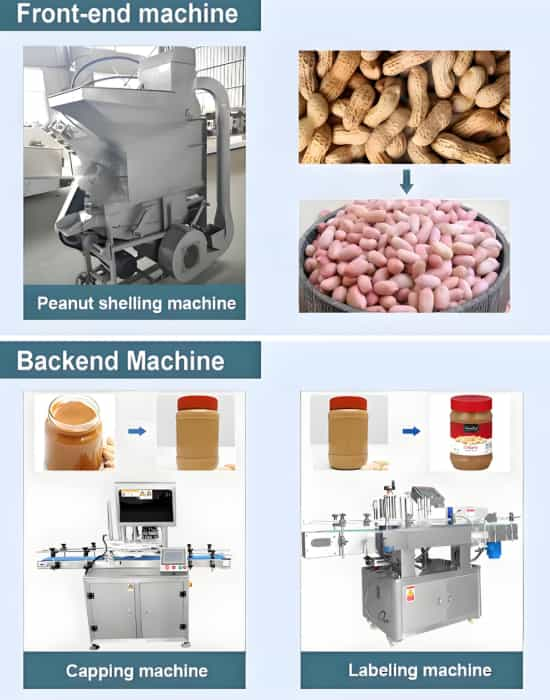
5. Tipuri de mașini de unt de arahide industriale
Există diferite modele de mașini pe baza tehnologiei de măcinare:
5.1 Mașină de unt de arahide coloid moară
- Cel mai frecvent tip.
- Rotor și stator de mare viteză creează o forfecare puternică.
- Produce o pastă ultra-fină și consecventă.
5.2 Mașină cu unt de arahide de piatră
- Utilizează măcinătoare din piatră naturală.
- Produce un gust mai tradițional.
- Producție mai mică în comparație cu fabricile coloide.
5.3 Linie de procesare combinată
- Include prăjire, peeling, măcinare, amestecare, și umplutură.
- Linie completă de producție de unt de arahide la cheie.
- Potrivit pentru fabrici mari.
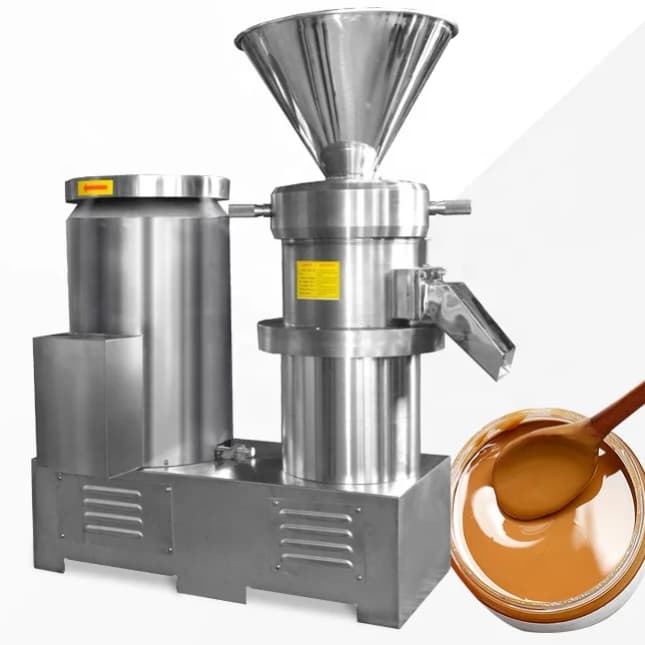
6. Aplicații industriale
Mașina nu se limitează la alune. Este utilizat pe scară largă în mai multe industrii:
- Industria alimentară: Unt de arahide, pastă de migdale, tahini cu susan, pastă de chili, sosuri.
- Alimente de sănătate: Butters natural de nuci fără aditivi.
- Cofetărie: Umplutură pentru ciocolată, cookie -uri, și gustări.
- Produse de export: Unt de arahide ambalat pentru supermarketuri.
7. Ghid de instalare și funcționare
Pas 1: Poziționare
Puneți mașina pe un apartament, suprafață stabilă. Asigurați alinierea corespunzătoare cu alte echipamente de producție.
Pas 2: Conexiune de putere
Conectați -vă la sursa de alimentare corespunzătoare (220V/380V/415V). Verificați împământarea pentru siguranță.
Pas 3: Sistem de răcire a apei
Dacă utilizați o mașină răcită cu apă, Conectați furtunurile de intrare și ieșire pentru circulație.
Pas 4: Hrănirea alunelor
Alimentați alunele prăjite treptat în buncăr. Evitați alunele neatinse sau umede.
Pas 5: Măcinare
Reglați decalajul dintre rotor și stator pentru a obține finerea dorită.
Pas 6: Colectare
Colectați untul de arahide finisat în containere din oțel inoxidabil pentru ambalare.
Pas 7: Curățare
Se spălă cu apă caldă după producție. Folosiți detergent de calitate alimentară pentru curățare profundă.
8. Sfaturi de întreținere
- Verificați regulat rulmenții și ungeți dacă este necesar.
- Curățați imediat după producție pentru a evita reziduurile.
- Înlocuiți piesele de măcinare uzate (rotor, Stator, sau pietre).
- Inspectați lunar componentele electrice.
- Evitați supraîncărcarea buncărului.
Întreținerea corectă asigură longevitatea mașinii și calitatea constantă a produsului.
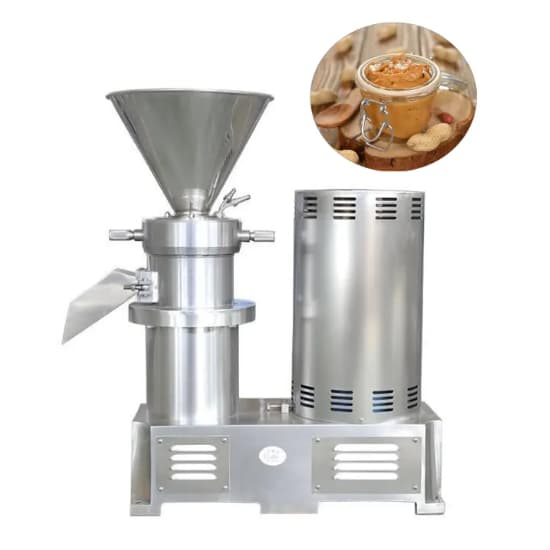
9. Cum să alegeți mașina potrivită
Când achiziționați o mașină industrială de fabricare a untului de arahide, ia în considerare:
- Capacitatea de producție - Potriviți ieșirea mașinii la cererea zilnică preconizată.
- Calitatea materialelor - Asigurați -vă Sus 304 sau 316 Oțel inoxidabil pentru igienă.
- Consumul de energie -Modelele eficiente din punct de vedere energetic reduc costurile.
- Suport după vânzare - Alegeți un producător cu asistență tehnică și disponibilitatea pieselor de schimb.
- Buget - Echilibrul dintre costul mașinii și beneficiile de producție.
10. Cerere de ofertă (RFQ) Ghid
Când contactați un furnizor pentru un RFQ, Oferiți detalii clare pentru a primi prețuri exacte.
Proba de întrebări RFQ & Răspunsuri:
Q1: Ce capacitate aveți nevoie?
A1: Exemplu: 500 kg/h Producție de unt de arahide.
Q2: Ai nevoie de o râșniță de sine stătătoare sau de o linie de producție completă?
A2: Exemplu: Linie completă, inclusiv prăjire, peeling, măcinare, amestecare, și umplutură.
Q3: Care este sursa de alimentare preferată?
A3: Exemplu: 380V, 50Hz, trifazic.
Q4: Ai nevoie de răcire a apei sau de răcire a aerului?
A4: Exemplu: Sistemul de răcire a apei este preferat pentru producția pe scară largă.
Q5: Ce tip de unt de arahide intenționați să produceți?
A5: Exemplu: Unt crem de arahide cu soi opțional crocante.
Q6: Care este cerința dvs. de ambalare?
A6: Exemplu: 200g, 500g, și borcane de 1 kg.
Q7: Aveți nevoie de suport OEM/branding?
A7: Exemplu: Da, etichetare personalizată și logo.
Q8: Ce certificări aveți nevoie?
A8: Exemplu: Aprobarea CE și FDA pentru exportul în UE și SUA.
Q9: Care este gama dvs. bugetară?
A9: Exemplu: $8,000 - $25,000 În funcție de dimensiunea mașinii.
Q10: Care este calendarul dvs. de livrare?
A10: Exemplu: În 45 zile după plată.
Furnizarea acestor informații ajută furnizorii să citeze cu exactitate și să economisească timp în negociere.
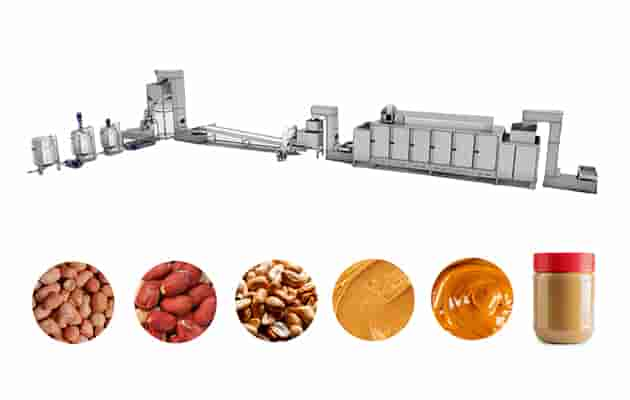
11. Un preț industrial de a face unt de arahide
Prețul variază în funcție de dimensiune, Caracteristici, și țara de origine:
- La scară mică (100–300 kg/h): $3,000 - $7,000
- La scară medie (300–1000 kg/h): $8,000 - $20,000
- La scară largă (1000–2000 kg/h): $20,000 - $60,000
- Linii automate complete: $50,000 - $200,000
Factorii care influențează prețul includ:
- Grad din oțel inoxidabil (304 vs 316)
- Marca motorului (Local vs International)
- Nivel de automatizare
- Nevoi de personalizare
12. Viitorul procesării untului de arahide
Cu cererea globală de gustări sănătoase și proteine pe bază de plante, Consumul de unt de arahide crește. Mașinile industriale vor continua să evolueze cu:
- Automatizare & Iot pentru producție inteligentă.
- Motoare eficiente din punct de vedere energetic pentru a reduce costurile.
- Capabilități cu mai multe nuci Pentru varietatea de produse mai largă.
- Designuri compacte pentru fabrici mici.
Investiția într -o mașină modernă de fabricare a untului de arahide industriale nu se referă doar la satisfacerea cererii - este vorba despre a rămâne competitiv.
Mașină industrială de fabricare a untului de arahide
The Mașină industrială de fabricare a untului de arahide este o investiție esențială pentru întreprinderile care urmăresc să intre sau să se extindă în industria de procesare a NUT -urilor. Cu o capacitate ridicată, Tehnologie avansată de măcinare, și design igienic din oțel inoxidabil, asigură producerea constantă de unt de arahide de înaltă calitate.
De la înțelegerea parametrilor tehnici la pregătirea unui RFQ, Planificarea atentă vă va ajuta să alegeți echipamentul potrivit pentru nevoile dvs. de producție. Indiferent dacă doriți o râșniță autonomă sau o linie de producție complet automatizată de unt de arahide, Mașinile moderne oferă flexibilitate, eficienţă, și rentabilitate.
Dacă sunteți gata să vă extindeți afacerea cu unt de arahide, Acum este momentul să investești în echipamente fiabile și să parteneri cu un producător de încredere.
